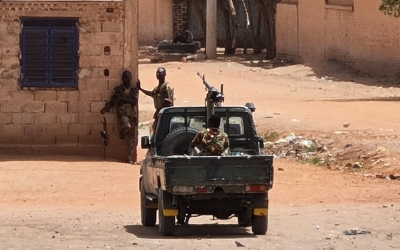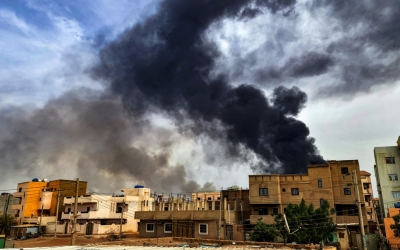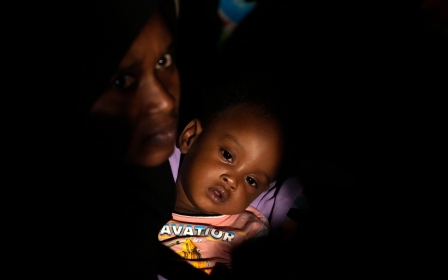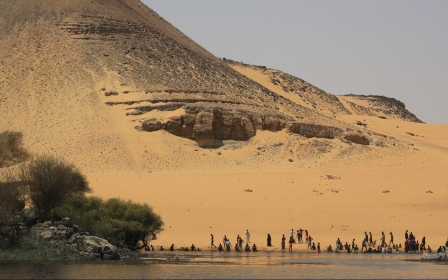Sudan's forgotten masses are dying every day of starvation

More than ten months into Sudan’s war, local sources across the country have told Middle East Eye that people are dying of starvation every day.
The humanitarian situation is dire, with the Sudanese Armed Forces (SAF) and its enemy, the Rapid Support Forces (RSF) paramilitary, accusing each other of obstructing aid deliveries and cutting access to the internet.
At the end of January, the International Organisation for Migration (IOM) reported that 10.7 million people have been displaced by conflicts in Sudan, nine million of them inside the country. This would leave Sudan with the highest rate of internal displacement in the world, surpassing even Syria’s 7.2 million.
The needs of the population dwarf the available funding. United Nations agencies say Sudan requires $2.7bn of assistance this year. So far, less than four percent of that has been provided by donors.
Just 43 percent of last year’s plan was funded and multiple sources have told MEE that Sudan struggles to gain international attention in comparison to conflicts in Ukraine and Gaza.
Stay informed with MEE's newsletters
Sign up to get the latest alerts, insights and analysis, starting with Turkey Unpacked
On the ground, malnutrition is killing children. A raft of diseases, including cholera - there are now more than 10,000 suspected cases in Sudan - have broken out. Doctors, hospitals, and emergency room activists providing aid in local neighbourhoods have been attacked. The harvest season has failed.
The army-aligned government is facing bankruptcy and has failed to provide proper humanitarian support, while the RSF has been accused of preventing aid from reaching the areas it controls.
The UN’s World Food Programme says that “at least 25 million people are struggling with soaring rates of hunger and malnutrition”, and that 3.8 million children under the age of five are malnourished.
Children dying every day
Multiple sources across Sudan told MEE that children are dying every day of hunger.
Three members of the nationwide network of mutual aid groups known as emergency response rooms (ERRs) told MEE that in the capital Khartoum, people are dying silently in their homes because of hunger.
In southern Khartoum’s Kalakla neighbourhood, one emergency room activist said, “we found three people who had died of hunger inside their home. Their neighbours buried them silently. It seems they had no food, no money and were afraid to go outside because of the continuous shelling”.
Other emergency room members told MEE the same thing was happening in Omdurman, Khartoum’s twin city and the site of a recent army offensive.
'The health situation in Darfur, especially in the refugee camps, is disastrous'
- Adam Rigal, IDP camp spokesman
A doctor in Kassala state, eastern Sudan, said many children there were dying of malnutrition.
“Children in the remote areas of Talkok, Allafa and other villages are dying of malnutrition,” the doctor told MEE. “When some of them arrived at Kassala hospital they were seriously malnourished and we failed to save their lives.”
The situation is perhaps worst in Darfur, the vast western region that serves as the RSF’s power base. There, Sudanese displaced by decades of fighting and living in internally displaced persons (IDP) camps face famine, malnourishment and much more.
Aid organisation Medicins Sans Frontieres (MSF) has estimated that in Zamzam, a camp in North Darfur, one child is dying every two hours and around 13 are dying every day.
“What we are seeing in Zamzam camp is an absolutely catastrophic situation. We estimate that at least one child is dying every two hours in the camp,” said Claire Nicolet, head of MSF’s emergency response in Sudan.
“Those with severe malnutrition who have not yet died are at high risk of dying within three to six weeks if they do not get treatment. Their condition is treatable if they can get to a health facility. But many cannot.”
Adam Rigal, a spokesman for those living in the IDP camps, said that children, pregnant women and the elderly were dying every day in camps across the region.
“We live in catastrophic and unprecedented humanitarian conditions imposed on us by both parties in the conflict as tens of children, pregnant women and elderly IDPs are dying daily due to acute malnutrition, lack of food, medicine and drinking water,” he told MEE.
“The health situation in Darfur, especially in the refugee camps, is disastrous,” Rigal added, pointing out that children had no access to food, medicine or shelter.
Tens of millions in need
Almost 25 million Sudanese are now in need of assistance, according to the UN.
“Currently, nearly 18 million people face acute food insecurity in Sudan, of which nearly five million are at emergency levels of hunger (IPC4),” the organisation’s World Food Programme (WFP) has said.
“International society should provide more attention and support to the humanitarian crisis in Sudan, given the severity of the country’s situation,” it said.
Sudanese Finance Minister Gibril Ibrahim has admitted the country is facing “serious economic challenges, with more than 80 percent of revenues lost due to the war”.
Addressing a press conference in Port Sudan on Tuesday, Ibrahim warned that the harvest season had failed in different states because of insecurity brought on by the war.
“We know that our people are suffering from high prices and lack of commodities, but we have to be patient and work together to end the war by the victory of our army. I think all these problems will be solved,” Ibrahim said.
The Sudanese organisation Fikra for Studies and Development has reported that Sudan’s domestic food production has dropped significantly because of the war.
“Only 37 percent Sudan’s agricultural land has been cultivated in comparison to previous years. Also, Sudan’s national wheat production has reduced by 70 percent,” the organisation said in a press release.
Blame game
Amid this turmoil, the two warring parties have traded accusations over who is responsible.
The army has accused the RSF of cutting off the country’s access to the internet, while the RSF has accused the army of blocking the flow of aid into Darfur.
Many more allegations have been made, as each side seeks to win the information war that has been raging since the fighting began on 15 April last year.
The army-aligned foreign ministry has denied blocking aid coming into Darfur from Chad, saying that this is one of the main routes for military supplies to the RSF.
Middle East Eye has previously reported on the RSF’s supply lines, which run into Darfur from Chad and the Central African Republic, and often originate in the United Arab Emirates.
In June last year, local witnesses told MEE that the RSF was behind the looting of WFP warehouses in el-Obeid. Markets named after the paramilitary leader, Mohamed Hamdan Dagalo, have sprung up across Sudan, selling looted goods.
“The RSF did not loot humanitarian aid warehouses in the areas under our protection, as relief aid did not reach these facilities in the first place,” the Rapid Support Forces said in a statement.
“Additionally, our forces are committed to protecting and delivering humanitarian aid to civilians in all areas, as per the permanent orders issued to them by the RSF leadership in this regard.”
Sudan has been under an internet blackout for more than a month, prompting thousands of people to use Elon Musk’s Starlink satellite internet to communicate and use banking apps.
Trying to gather further international support in Sudan’s darkest hour, Fikra for Studies and Development has launched a global call for the announcement of famine in Sudan by aid agencies.
“The humanitarian situation in Sudan, especially in Khartoum, has sharply deteriorated after the cut of telecommunications. The mass kitchens operated by the emergency rooms have stopped their work due to the lack of the groceries,” the organisation said.
“It seems that the international community has lost its interest in helping Sudan, so at this moment let us raise our voices to say that the Sudanese are not just dying because of bullets but rather that they are also dying of hunger and disease.”
This article is available in French on Middle East Eye French edition.
Middle East Eye delivers independent and unrivalled coverage and analysis of the Middle East, North Africa and beyond. To learn more about republishing this content and the associated fees, please fill out this form. More about MEE can be found here.




